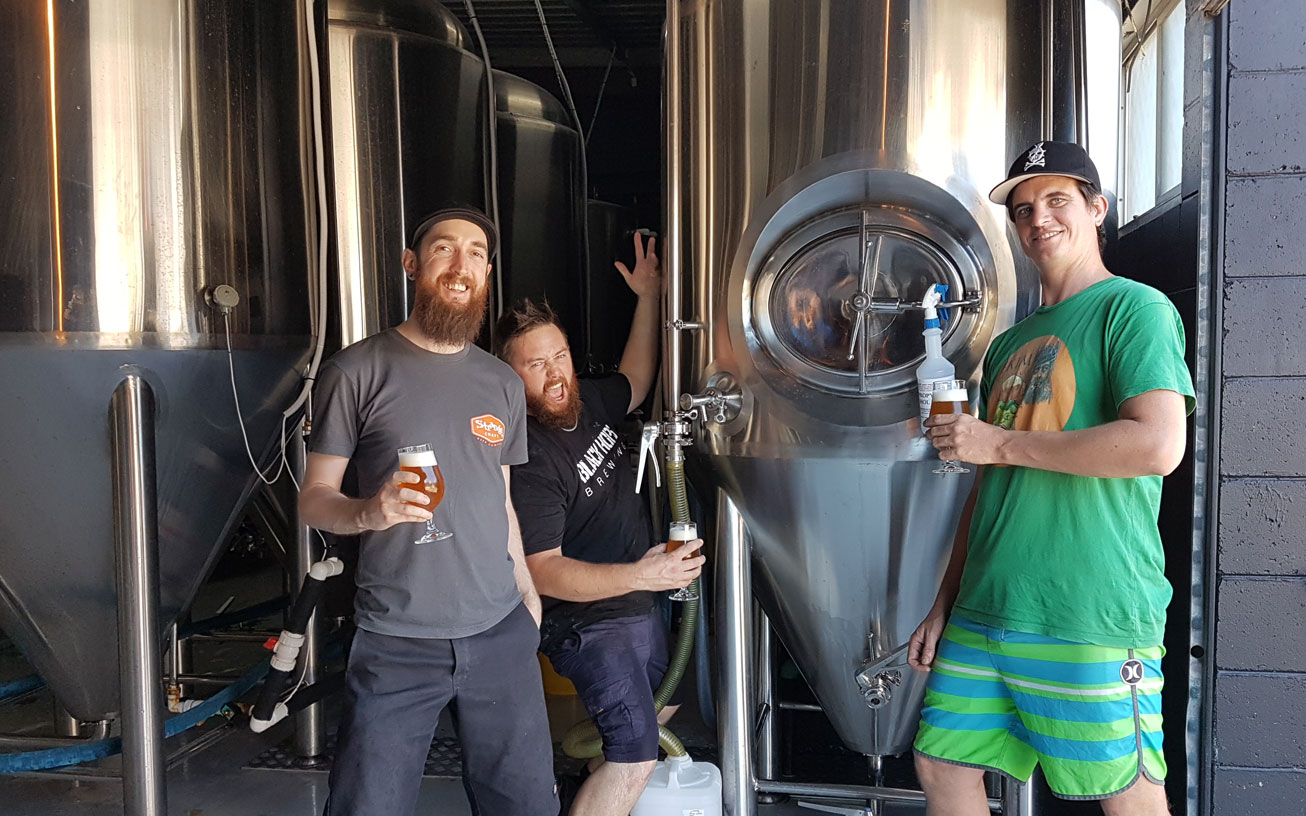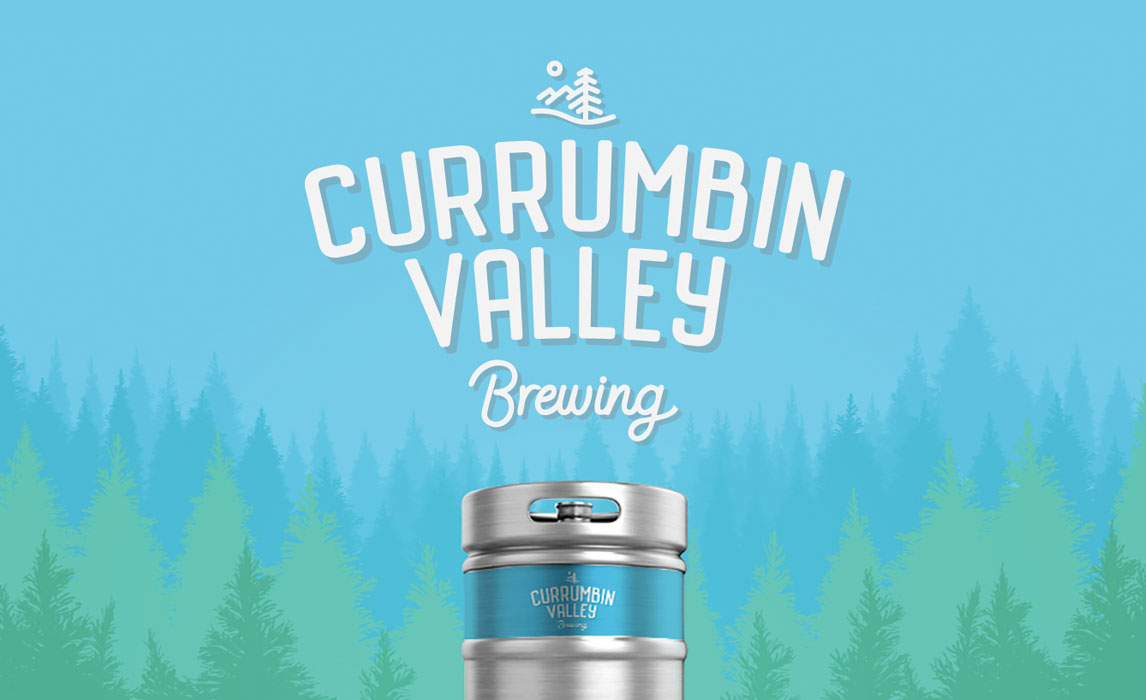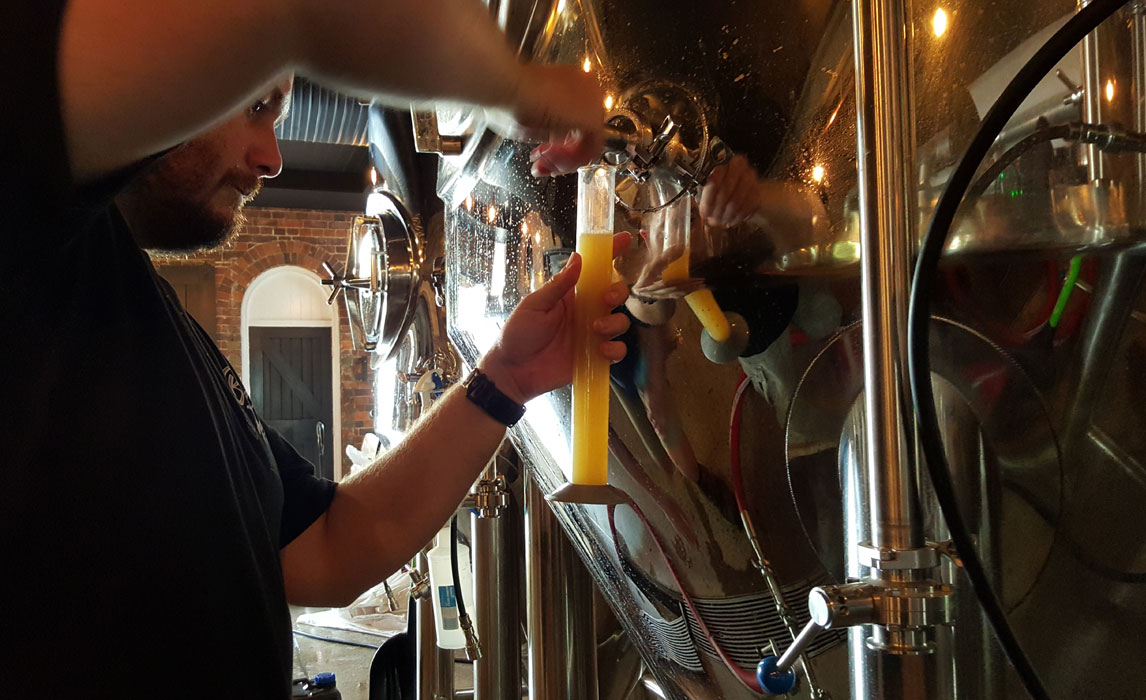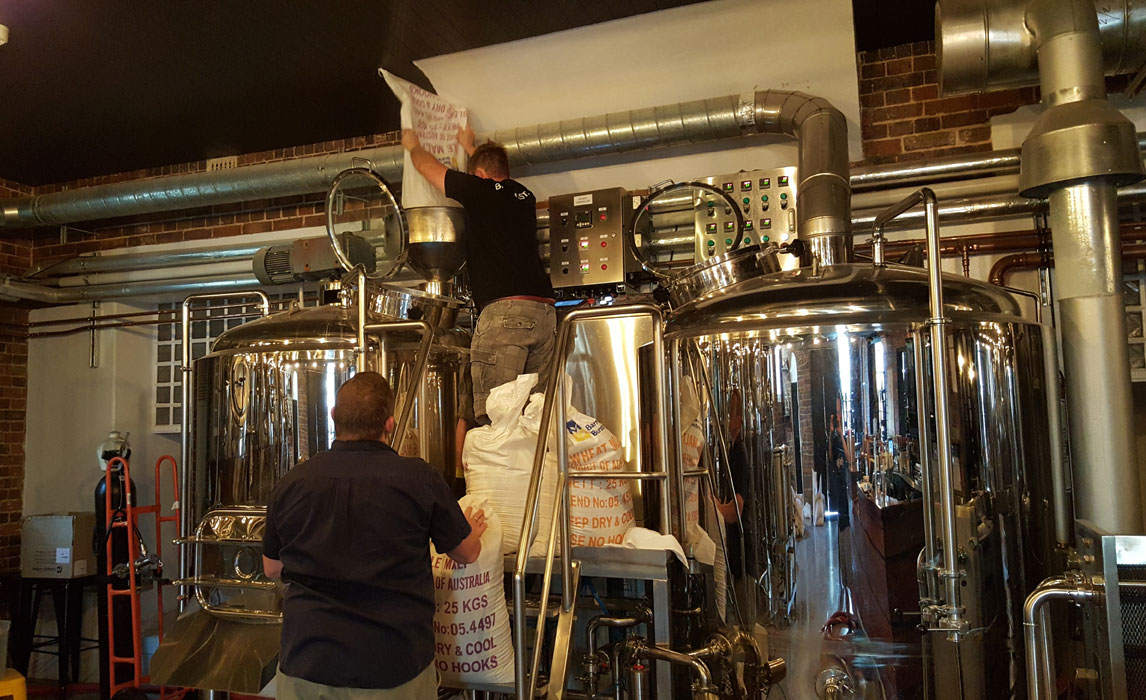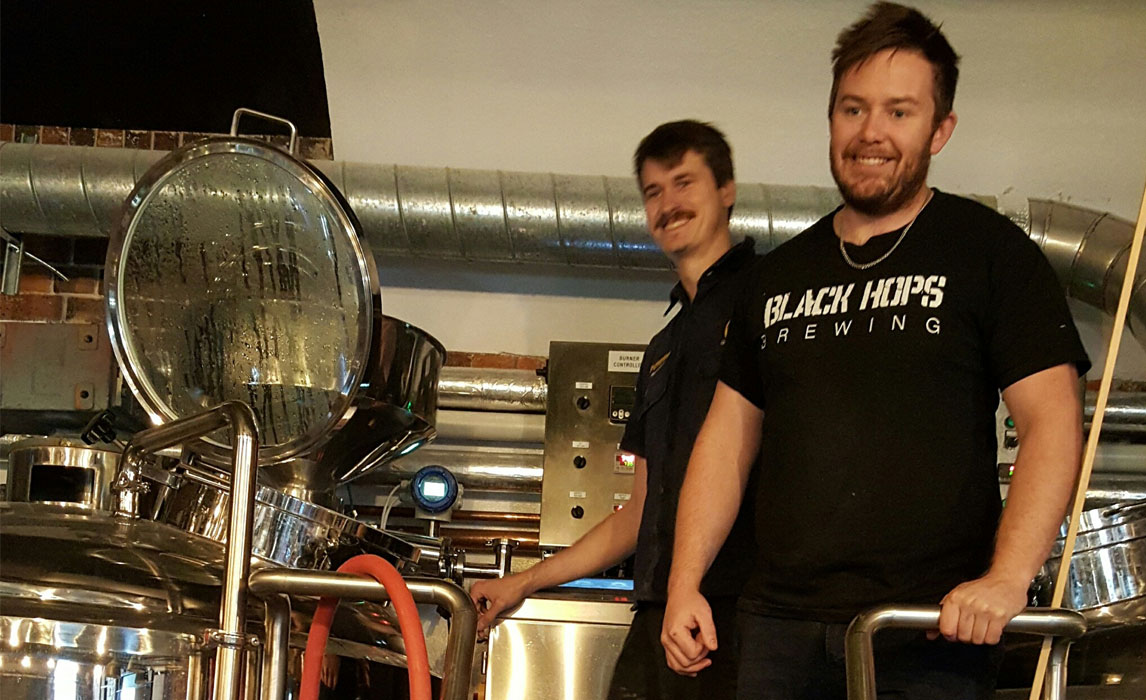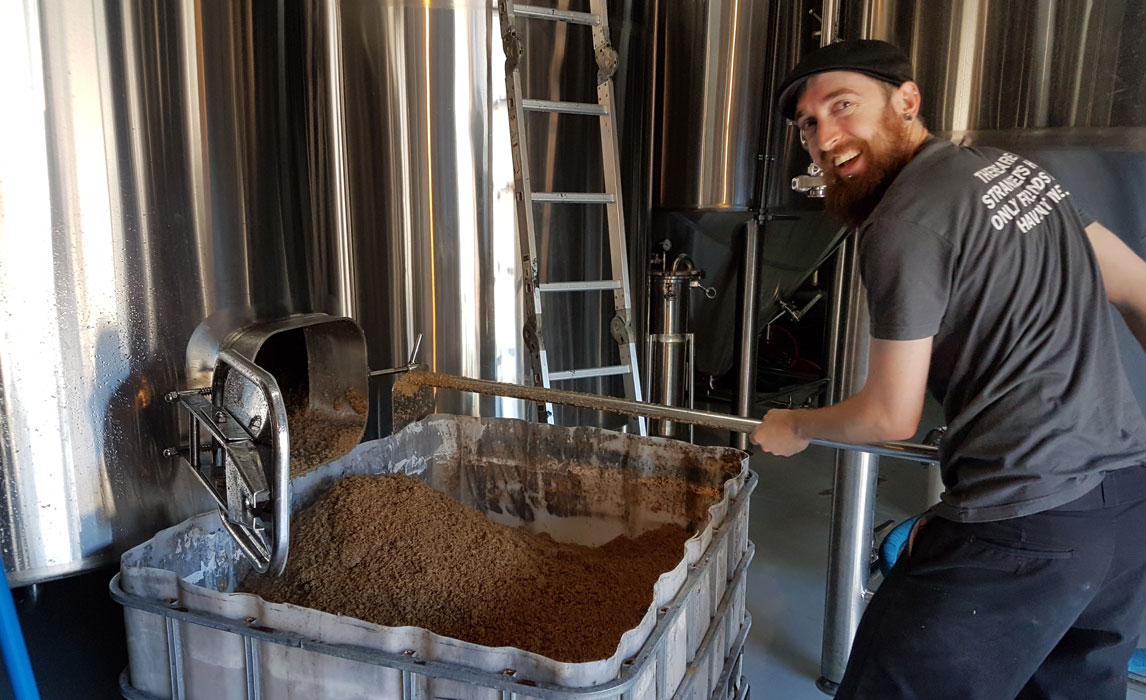Before opening the Black Hops Brewery, we were Gypsy brewers. That meant moving around looking for breweries who could fit us in, and brewing on their equipment.
We were always keen to offer tank space to up and coming brewers once we opened our own brewery, but with our limited space, the reality quickly set in that it wouldn’t be easy to find space.
Luckily this week, we were able to squeeze in our good mates Luke and Pete from Currumbin Valley Brewing to brew their first commercial batch. We’ve known them for years and had been chatting to them for months waiting for an opportunity.
They will be launching with a double IPA which we brewed this week, watch out for it in the coming weeks.
In this post we’ll run through what Gypsy brewing is and exactly how it works.
What is gypsy brewing?
Gypsy or contract brewing is a business model for bridging the gap from home brewing to commercial brewing. The way it works is that you brew your beer at someone else’s venue using their equipment and pay them a fixed fee to do it. The rest is up to you, from marketing and selling to putting up the money for the batch.
Some brewers are happy to remain gypsy brewing and have made a real success of it. Steve ‘Hendo’ Henderson, who provided the Foreword to our book Operation Brewery, is a case in point. His gypsy brewing operation BrewCult, enjoys national distribution and recently won the inaugural “Champion Gypsy Brewer” Trophy at the 2016 Australian International Beer Awards (AIBAs).
For us, and many other brewers, it’s a stepping stone on the way to owning a brewery.
How did we make it work for Black Hops?
Gypsy brewing is something that works from a small scale level of 50-litre batches all of the way to a large scale level of 10,000-litre-plus batches.
It was perfect for us when we started out on our brewing journey. After we came up with our first homebrew of Eggnog Stout, we progressed more on our branding and more stories were written about the beer. The homebrew became known as the Pilot Batch and our priority turned to finding the best way to get it out.
In the startup world, there’s a thing called a Minimum Viable Product (MVP). The idea is you do the simplest and cheapest product possible to test your hypothesis for the business. When we first started, we simply wanted to test if we could make the Eggnog Stout work, so the pilot batch represented the MVP for that idea. After we knew it worked, we needed an MVP for selling it commercially.
So gypsy brewing our first commercial release was an MVP of sorts. It meant we didn’t have to have our own brewery, but we could do a small run of beers and test the market before investing any more time and money.
After we successfully gypsy-brewed our first batch of Eggnog Stout we started brewing small 50-litre batches at Bacchus Brewing in Brisbane. Their facility enabled us to brew 5 different 50-litre brews at once, which meant we could test out a lot of different styles. We also worked with Wade Curtis from Four Hearts Brewing at Ipswich on 1,200-litre batches.
While gypsy brewing model was a great fit for us starting out and trying to make a name for ourselves, it wasn’t really going to take us to the next step. Being a small scale brewery, it wasn’t the most efficient way to make a lot of beer, which also made it comparatively expensive. We also wanted our own space. We wanted full control of the process, and we wanted our own home to show off to the Gold Coast. Having no option close to home was also another factor. Driving a 2.5-hour round trip to do a 5-minute dry hop isn’t great use of your time.
So we took the next big step and transitioned to our current business model.
What to look for
Here are some things to consider if you’re planning on taking the step up from hobby brewer to gypsy brewer.
- Availability – not every brewery will let people gypsy brew, and even if they do, they may not have tank space available. At Black Hops for example we haven’t had tank space available in 3 months since launching and won’t any time soon. Through our time as contract brewers, we brewed at four different locations, but early on, it was extremely difficult to get tank space. Once we’d forged more relationships and credibility, it became easier but ultimately the inability to brew elsewhere was one of the key reasons for opening our own space.
- The brewer – you want to brew with someone you like and who knows what they are doing.
- The size – a huge system is great, but you have to sell the beer, and because you are paying to rent it, small batch contract brewing is rarely a profitable exercise. We were prepared to break even or even lose money on some brews because the purpose was market testing, not money making. For our first batch, we just wanted to crank out a few kegs, so we targeted a system around 500 to 1,000 litres.
- The facility – not all breweries are created equal, so we investigated our options before deciding on the one to go with.
- The location – without a doubt, the closer to home the better. It frustrated the hell out of us having to rely on daily or weekly updates about how the beer was progressing. However driving 2.5 hours to take a gravity reading, or a mid ferment taste or dry hop wasn’t great use of our time either.
- Supporting services – the brewery might also help with other requirements like off-site storage and keg hire. There is a lot to think about when you make beer, so weigh all of this up.
- Price – of course, the price matters too.
Things to cover off before you start contract brewing
There is a lot that has to happen between planning a beer and the brew day. Here is a quick rundown of all the things we covered off prior to our first gypsy brew.
- Contracts – for some of our gypsy brews we had contracts in place, while others were a lot looser. In hindsight a contract is probably always a good idea.
- Scaling the recipe – taking your recipe from a small home recipe to 1,000+ litres will require work with the head brewer. They will know their system best so trust them. At the end of the day it comes back to working with someone who you like and can trust.
- Ordering ingredients – ordering a 90-gram bags of hops from your local homebrew store is generally quite easily done. Buying enough of that same hop on a large scale isn’t always something the brewery you are working with may be able to provide. So be prepared to switch hops or be flexible.
- Special requirements – consider any yeast preparation requirements or special additions along the way. For example, with our Beach House Ale we use a French Saison yeast and grow it over a few days leading up to the brew. With Eggnog Stout, we infuse spice into brandy over a fortnight, which all takes planning so it’s ready when you need it.
- Licensing – some breweries may allow you to operate under their producer/wholesaler licence. What this means is they will invoice venues and will also have to chase up unpaid invoices. We got our producer / wholesaler licence so we could take responsibility of this. For people brewing at Black Hops HQ, we require them to have their own license.
- Licensed premises and logistics – understanding where you can store alcohol is a must. The best option for small scale gypsy brewing is to pre-sell the entire batch and get it out the door to venues once kegged. If this isn’t an option you’ll need to have a licenced premises available to you for storage. Cold storage is a must, this is a requirement of liquor licensing.
- Pricing – this is entirely up to you. With our gypsy brewing arrangements we made little to no money, but we weren’t intending to. We used the exercise to test some recipes and build our brand. Some kegs we sold at a loss, some broke even. If we ever made a small profit it was very hard to calculate when figuring in factors such as driving a single keg delivery from the Gold Coast to Byron Bay for free.
There are also additional costs, outside of what the brewery will charge, such as:
- The cost of a Producer/Wholesaler licence.
- Kegs – if you don’t have your own you will need to rent these. We used Kegstar, but it is an added cost. Budget $15 per keg, assuming you move them quite quickly.
- Storage – where will the beer be stored? Ideally pre-sell as much as you can and get it out as quickly as possible. Beer needs to be stored at a licenced venue so you need to think this through at the start.
- Pick up – on kegging day we would hire a truck to drive the kegs from where we brewed it to where it needed to go, either home, storage or delivery. We were paying roughly $300 for this, so in a batch of 1500L/ 30 kegs this alone added $10 to the total keg price.
- Decals – you can either print and laminate these very cheaply or have them printed professionally. Budget a few dollars each if professionally done, or more if it’s only a very small run.
Brew day
The Brew day is fun, but expect a lot of standing around..and some beers. Some gypsy brewing arrangements might have you doing the brew unsupervised, but when starting out expect that you’ll be watching and helping the head brewer do the brew, add the hops and clean. You will definitely be emptying the lauter tank!
If you have any questions about Gypsy brewing, feel free to join the free Black Hops Ambassador group on Facebook. This is one of many topics we covered in Operation Brewery, Everything you need to start a craft brewery on a budget. You can grab it here.
